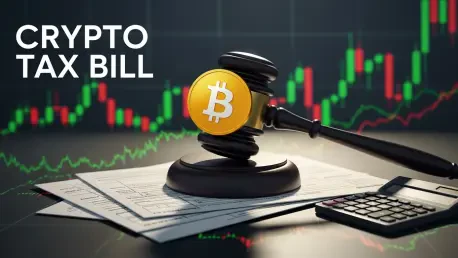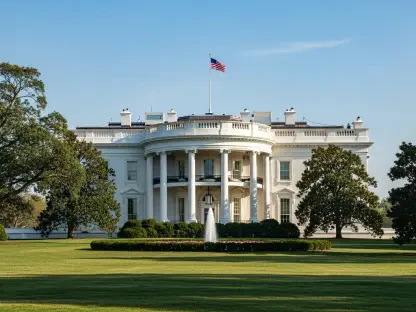In a rapidly evolving digital economy, few stand as poised to impact the legislative landscape as Donald Gainsborough, leading policy expert and head of Government Curated. His insights on a new cryptocurrency taxation package promise to reshape how digital assets are governed and understood in the U.S., potentially bolstering innovation while simplifying tax obligations.
Can you explain the key features of your new cryptocurrency tax legislation?
The legislation is designed to modernize how we tax digital assets, ensuring they align with our broader economic goals. A critical feature is the de minimis rule for digital assets, which exempts transactions under $300, thus relieving small-scale users from cumbersome tax reporting. Additionally, it proposes exemptions for crypto lending and defers taxes on income from mining and staking until these tokens are actually sold, all helping to create a more user-friendly experience in the digital financial space.
What is the purpose of introducing a de minimis rule for digital assets?
The de minimis rule primarily targets reducing the burden on digital asset users engaging in routine, minor transactions. By exempting such transactions from taxation, it allows users to freely transact without worrying about adverse tax implications. This not only simplifies the tax reporting for individuals but also encourages the adoption of cryptocurrencies for everyday use.
How does the proposed legislation plan to handle taxation for crypto lending?
Our proposal effectively exempts income earned through crypto lending from being taxed. This is crucial because it acknowledges the non-liquid nature of these transactions and fares better in fostering growth within the innovative sphere of DeFi, where lending plays a significant part.
How will taxes on income generated from crypto mining and staking be deferred under this bill?
The approach here is pretty straightforward yet innovative. Taxes on income generated through mining and staking will be deferred until the point of token sale. This means miners and stakers aren’t taxed on what they essentially haven’t realized; income is only taxed upon actual sale of the mined or staked assets, providing them flexibility and aligning with typical realization-based tax principles.
Could you elaborate on how the 30-day wash rule will apply to digital assets?
Applying the 30-day wash rule to digital assets closes a substantial loophole. Currently, investors can sell at a loss to claim tax deductions and then immediately repurchase those assets. By extending the rule, it prevents this kind of maneuver; digital asset investors must wait 30 days before reacquiring the same tokens if they wish to benefit from a tax loss, similar to traditional securities.
What changes will crypto dealers and traders see with respect to mark-to-market treatment?
The adoption of mark-to-market treatment for crypto holdings transforms how dealers and traders report taxes. They would have to value their holdings as if sold at market price at year’s end, thus recognizing gains or losses annually. This enables them to claim losses upfront, which can be crucial in a volatile market like cryptocurrency.
Can you explain how the estimated $600 million in revenue through 2034 will be generated under this bill?
The estimated revenue primarily arises from closing tax loopholes and ensuring comprehensive reporting by crypto investors, coupled with increased clarity and compliance. With tax deferrals and exemptions, these elements together encourage long-term transparency and accountability, which we project to stabilize and eventually increase governmental revenue from digital asset taxation.
How does this legislation aim to simplify the tax process for individuals involved in the digital economy?
Simplicity is at the core of this legislation. The de minimis exemptions and deferral options make personal tax obligations less daunting and more predictable. The reduced complexity in reporting small transactions encourages fuller participation in the digital economy without fear of tax missteps.
What are some potential benefits for American innovation as a result of this legislation?
By removing archaic tax obstacles, we empower innovators and digital pioneers to experiment and develop revolutionary technologies without fearing punitive tax repercussions. This environment of openness and protection helps America maintain its cutting-edge position in global technological advancements.
You mentioned the legislation is fully paid for. How was this achieved?
Balancing the budget was crucial, and it was done by recalibrating tax mechanisms and ensuring that income deferrals eventually result in tax collection as well as diligently closing existing loopholes. The anticipation of wider compliance and participation in the digital economy also plays a role in making this financially viable without extra burden.
With your crypto tax measures not being included in the reconciliation bill, what are your plans to ensure its passage in some form?
Persistence in advocacy is key. While the reconciliation bill didn’t incorporate these measures, we stay engaged across Senate and House discussions, aligning interests and emphasizing the crucial need for updated frameworks that reflect contemporary market realities. Ongoing legislative dialogues remain promising avenues for progress.
Given the Senate’s recent passing of a bill for stablecoin regulation, how does your legislation align with ongoing efforts in Congress?
Our legislation dovetails with the Senate’s actions on stablecoins by contributing to a cohesive regulatory environment. Both aim to provide structured guidelines that prevent misuse while fostering innovation. Together, they ensure cryptocurrencies have a robust framework that supports growth while maintaining security and compliance.
How do you see the role of House panels in advancing broader cryptocurrency market oversight?
House panels are instrumental as they bring diverse perspectives and expertise needed to refine and advocate for effective cryptocurrency oversight. Their role in navigating stakeholder interests and aligning regulatory measures with technological advancements is vital for comprehensive governance.
Are there any particular challenges you anticipate in gaining support for your bill in the House?
Support hinges on clear communication and addressing misconceptions about digital asset taxation. The challenge lies in ensuring lawmakers understand the long-term benefits of modernized tax code and its role in fostering innovation, and how these adjustments can genuinely serve the greater economic interest.
How do you foresee this legislation impacting everyday Americans who participate in the digital economy?
This legislation stands to significantly ease the engagement process for everyday Americans, making digital assets more accessible and less daunting. With straightforward, fair taxation, individuals can participate without inadvertent liabilities, fostering a more inclusive digital trade environment.
Do you have any advice for our readers?
Embrace the future of the digital economy, stay informed, and don’t shy away from engaging with it. Understanding and participating in shaping the regulatory landscape ensures that innovation and common interest can thrive together.









